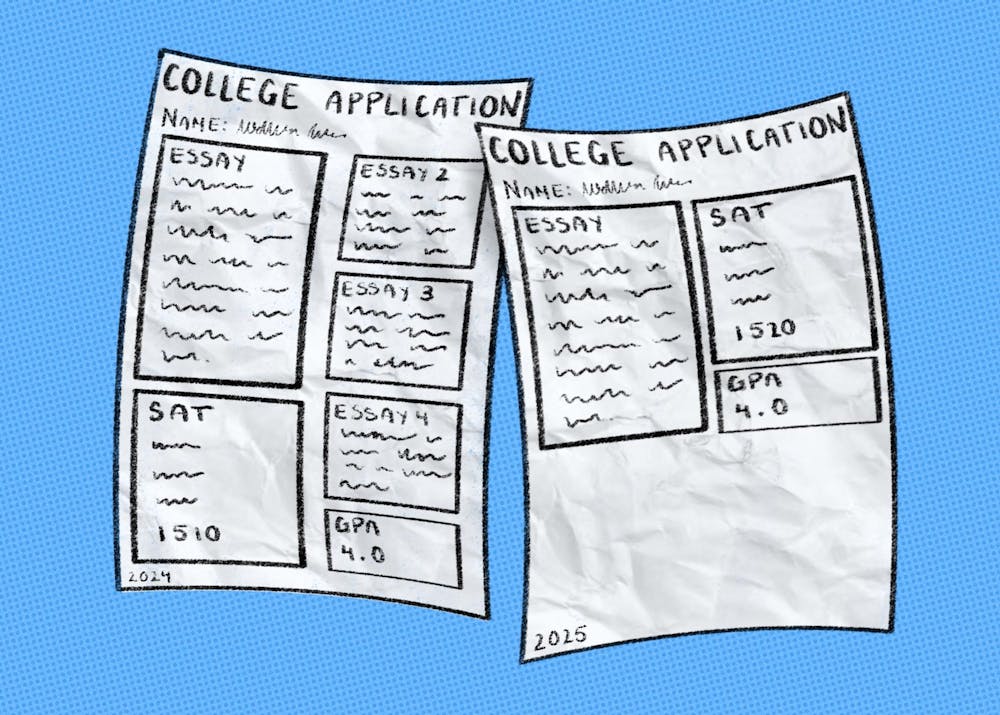This summer, the admissions office quietly announced that the University would no longer be requiring supplemental essays for most applicants, except those applying to the School of Nursing. For decades, these essays have served as a way for applicants to share personal information that helped inform admission officers’ decisions, offering a glimpse into their values, experiences and ambitions outside of the Common App Personal Statement. With their elimination, the admissions office loses a critical window into applicants’ personalities and backgrounds, limiting its ability to holistically evaluate if a student would be a good fit for the University.
Interestingly, this announcement came just over a month after the resignation of former University President Jim Ryan. For the past three years, the required supplemental essay asked students, “What about your individual background, perspective, or experience will serve as a source of strength for you or those around you at U.Va.?” This prompt, ostensibly introduced following the Supreme Court decision against affirmative action in June 2022, allowed students to share how their experiences shaped them. Its sudden removal shortly after Ryan’s resignation, which was accelerated by political pressure from the Trump administration — including an investigation into their diversity policies in admission — is difficult to see as a coincidence.
This change will likely increase the number of applications the University receives because it is easier to apply, which will in turn lower the acceptance rate. This tactic, which has been used by other schools like Northeastern University, can create the appearance of greater selectivity without actually changing the quality of admitted students. In the University’s case, however, this is counterintuitive. The University already boasts a 17 percent acceptance rate and is ranked as the no. 4 public school in the nation, so there is little practical need to artificially boost selectivity. The change likely stems from one or more practical considerations — convenience for applicants, reduced workload for the admissions office, or the appearance of increased selectivity. Yet all of these rationales undermine the University’s commitment to evaluating students as whole individuals. Instead, this move prioritizes convenience for both applicants and the admissions office over a nuanced assessment of who would actually thrive at the University.
Removing essays entirely, rather than just reverting to their previous tradition of using expressive, personable prompts from before the 2022 switch to the background essay, marks a significant departure from the school’s admissions culture. For years, prospective students were asked questions like “What’s your favorite word and why,” “If you could choose a theme song to play every time you walked into a room, what would it be” and other lighthearted prompts. These prompts encouraged creativity and gave applicants an opportunity to show individuality beyond just transcripts, extracurriculars and test scores.
Without supplemental essays, admissions officers are forced to rely more heavily on metrics that favor students from well-resourced backgrounds, since these students have a disproportionately high level of access to test prep and other academic resources. To this point, removing supplemental essays could result in a university that is more impressive on paper, but less distinctive and engaged. By reducing the gamut of expression that was previously required on the application, admissions officers are left with fewer ways to evaluate how students might contribute to the University beyond academics and their high school extracurriculars.
One justification that could be offered for this change is the increasing role of artificial intelligence in essay composition. With AI tools increasingly available to generate polished responses, many schools have changed their approach to supplemental essays. Schools like Duke University and the California Institute of Technology have changed their admissions policies to accommodate this by using evaluation methods that focus less on polished prose and more on the content, insight and personal perspective to emphasize students’ authentic voices. By contrast, the University’s decision to remove supplemental essays entirely ignores the intention that these other top schools had to preserve personal expression.
Prospective applicants for this admissions cycle have already submitted or will be submitting their applications without any essays beyond their personal statement. However, the University still has the chance to act for future applicants. For the 2026-2027 admissions cycle, the University should plan to restore supplemental essays in some form, ideally through prompts that encourage creativity and reflection. Whether that means going back to the recent background prompt, the previous quirky essays or implementing new prompts entirely, having some sort of supplemental essay is essential for reaffirming the University’s commitment to holistic admissions.
The University has both the resources and reputation to design an application process that is as fair and authentic as possible, and choosing not to do so signals a troubling willingness to reduce students to numbers at a time when institutions like the University are under heightened scrutiny. If the University is serious about fostering a student body that advances the school’s values, it must give applicants the opportunity to express those qualities.
Ryan Cohen is a senior associate opinion editor who writes about economics, business, and housing for The Cavalier Daily. He can be reached at opinion@cavalierdaily.com.
The opinions expressed in this column are not necessarily those of The Cavalier Daily. Columns represent the views of the authors alone.







